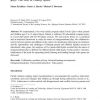Free Online Productivity Tools
i2Speak
i2Symbol
i2OCR
iTex2Img
iWeb2Print
iWeb2Shot
i2Type
iPdf2Split
iPdf2Merge
i2Bopomofo
i2Arabic
i2Style
i2Image
i2PDF
iLatex2Rtf
Sci2ools
118
click to vote
CSCL
2010
2010
Using activity theory to understand intergenerational play: The case of Family Quest
We implemented a five-week family program called Family Quest where parents and children ages 9 to 13 played Quest Atlantis, a multiuser 3D educational computer game, at a local after-school club for 90-minute sessions. We used activity theory as a conceptual and an analytical framework to study the nature of intergenerational play, the collaborative activity between parents and children in the context of role-playing virtual game environment, and the opportunities and challenges of bringing parents and children together around an educational video game. Our analyses of five parent-child dyads revealed that the nature of intergenerational play is different for different parent-child dyads, but has positive outcomes. Implications of the study for supporting family learning and bonding through video games are discussed. Keywords Collaborative problem solving . Informal learning environments . Intergenerational play. Parent-child interaction . Video games
| Added | 14 May 2011 |
| Updated | 14 May 2011 |
| Type | Journal |
| Year | 2010 |
| Where | CSCL |
| Authors | Sinem Siyahhan, Sasha A. Barab, Michael P. Downton |
Comments (0)

